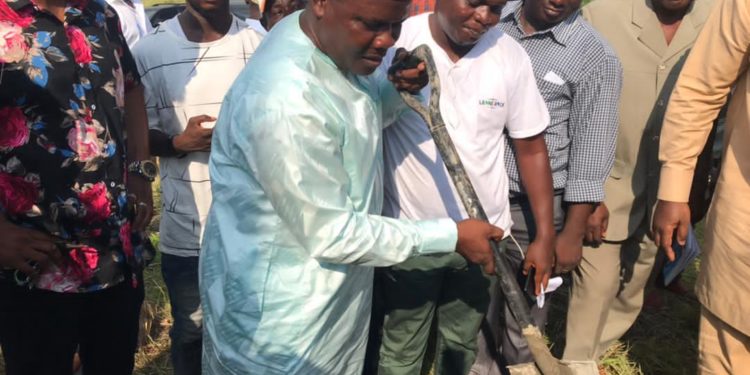By Mohamed M. Sesay in Makeni
Construction work for a student hostel is underway in Yoni Village, Bombali District, the first major step towards addressing the growing problem of accommodation for the University of Makeni (UNIMAK).
The 75-room facility which is located within the Yoni Campus of the university in the outskirts of the city of Makeni, is a collaboration between the Sierra Leone government, the District Council and the European Union (EU).
UNIMAK, the first private university in the norther region of Sierra Leone, was founded in 2005 by the Catholic Mission and fully accredited in 2009. It remains one of the top higher institutions of learning in the country, providing competitive courses for students drawn from all corners of the country.
The popularity of UNIMAK’s courses has forced it to expand its space to accommodate more students over the years, leading to the establishment of the Yoni Campus which is in Gbanti Chiefdom and hosts four departments – law, computer science, agriculture and public health.
Minister of Local Government and Rural Development, Tamba Lamina, presided over the ceremonial sod-turning event marking commencement of construction work on June 9th. He told the gathering comprising district authorities, university officials and students that the project estimated to cost Le6.3 billion is in line with the development aspirations of the administration of President Julius Maada Bio, which is to build the capacity of the country’s human resources and strength institutions.
“One way we can achieve this is to build hostels,” Mr Lamina said.
“This is a great day not only for Gbanti but also for Bombali and by extension for Sierra Leone,” he added.
As a government, the Local Government minister said, they are very much aware of the risks that students faced in leaving their homes in search of quality education, especially girls who have to deal with security and safety issues.
“We believe that also for the local council, this is a revenue generation enterprise. Many students will pay to stay in hostel. The revenue will come back to the council which can build more hostels or invest back into other areas.” Minister Lamina said.
According to officials, the hostel project is part of implementation of a document developed jointly by the government and the EU which details the capacity needs of local councils. Bombali was one of four councils that benefitted from the subsequent EU funding, out of the 22 Local Councils nationwide.
John Shanghai Koroma, Chairman of the Bombali District Council, was instrumental in the realization of this project. He said his desire to have the fund invested in the project was inspired by a personal experience that exposed him to the realities UNIMAK students face while trying to cope with accommodation challenges.
Koroma explained that he witnessed an accident between his village and Makeni involving female students who were traveling on a motor bike to meet up with fellow students for night studies.
“When I spoke with the student, she told me she was coming from Binkolo, 15 miles from Yoni Village,” Koroma recalled.
“The accident was severe,” he lamented, adding that subsequent enquiries revealed that students were dealing with high cost of accommodation, which prompted him to argue in favour of investing in a hostel project.
Following feasibility studies, Koroma said they discovered that many of the students of UNIMAK stayed within the Yoni Village.
“We noticed that most of them come from far areas like Freetown, Kenema, Bo, Kailahun and beyond,” he said.
Yoni is located five miles from Fatima campus which is home to the administrative offices of UNIMAK, situated along Saint Francis Road on Azzolini Highway in the heart of the city.
The students say they are at the mercy of landlords who hike rent payment indiscriminately. Those who can’t afford the costly rent have to deal with the demand for two-way fare for lectures daily.
Mariatu Conteh, a female public health student, spent about Le20,000 daily on transportation between the two locations, until she decided to rent an apartment at Yoni.
At first, she said she paid Le2, 200, 000, and the rent was recently increased by Le300, 000.
Fellow departmental colleague, Mohamed Alim Fofana, who is in his second year of studies, was also forced to rent an apartment after a series of hike in bike fares due to recent developments in the petroleum sector.






















